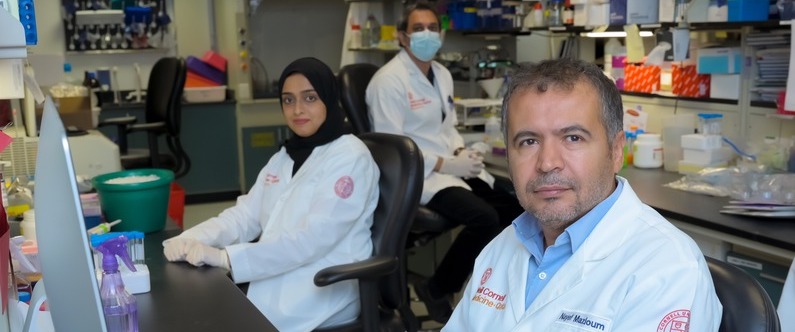WCM-Q researchers discover mechanisms driving inflammation in obesity, cancer and type 2 diabetes
 Dr. Nayef Mazloum, Dr. Aisha Madani, and Dr. Yasser Majeed.
Dr. Nayef Mazloum, Dr. Aisha Madani, and Dr. Yasser Majeed.
Researchers at Weill Cornell Medicine-Qatar (WCM-Q) have made new discoveries about the processes by which fat cells damaged by obesity produce harmful inflammatory molecules that can trigger insulin resistance and ultimately lead to type 2 diabetes.
The research, led by WCM-Q’s Dr. Nayef Mazloum, focused on preadipocytes, which are precursors to fat cells. In obese individuals, some preadipocytes do not become normal, healthy fat cells, but instead become prematurely aged, or senescent. In this dysfunctional senescent state, they begin to secrete increased levels of inflammatory cytokines, including a key cytokine called interleukin-6 (IL-6), as well as other inflammatory molecules. Elevated levels of these inflammatory molecules are known to be associated with insulin resistance and type 2 diabetes.
To investigate the mechanisms underpinning this inflammatory activity, Dr. Mazloum’s research team artificially damaged the DNA of preadipocyte cells to induce them to become senescent. They then focused on a specific type of cell receptors (called purinergic receptors or purinoceptors), which are embedded in cell membranes. These purinoceptors are involved in regulating the functions of cells by interacting with extracellular ‘danger-signaling’ molecules (called agonists), including a group of structurally similar molecules called ATP, ADP, and adenosine.
While previous research had demonstrated a link between cellular senescence, ATP and inflammation, the precise mechanisms driving these links were not well understood. Dr. Mazloum’s research team demonstrated that the activity of the purinoceptors for ATP, ADP and adenosine in senescent preadipocyte cells was dramatically elevated; they also showed that exposure to the agonists ATP, ADP and adenosine increased the secretion of the key inflammatory cytokine IL-6, which contributes to increased local and systemic inflammation throughout the body, a key contributing factor to insulin resistance and type 2 diabetes.
Furthermore, the research team also found the same link between cellular senescence and purinergic signaling in endothelial cancer cells, raising the possibility that upregulated purinoceptors play key modulatory roles in cancer. This points the way to the potential development of new drug therapies to treat inflammatory disorders by disrupting the activity of purinoceptors. There is also scope to investigate the use of existing drugs that inhibit purinoceptors for this purpose. The research has been published in the British Journal of Pharmacology.
Dr. Mazloum, assistant professor of microbiology & immunology/assistant dean for student research at WCM-Q, said: “The main implication of our study is that we found a previously uncharacterized link between senescence and the purinoceptors in preadipocytes that appears to be a key modulator of inflammation. This has implications for our understanding of the role of inflammation in senescence- associated conditions like obesity, type 2 diabetes and aging -related diseases.”
Other contributors to the study were Dr. Yasser Majeed, research associate in microbiology & immunology at WCM-Q; Dr. Aisha Madani, a postdoctoral associate in microbiology & immunology at WCM-Q; Ms. Muneera Vakayil, a graduate student in the College of Health and Life Sciences at Hamad Bin Khalifa University; Dr. Khaled Machaca, professor of physiology and biophysics/senior associate dean for research, innovations, and commercialization at WCM-Q; Dr. Raphael Courjaret, assistant professor of research in physiology & biophysics at WCM-Q; and Professor Samuel J. Fountain of the University of East Anglia in the UK. In addition, WCM-Q second-year medical student Ahmad Altamimi contributed to the study, having begun working on the project while he was a pre-medical student, leading to the research being shortlisted in the 14th annual UREP competition of Qatar National Research Fund.
Dr. Majeed said: “We are extremely pleased that this study was so successful, not only in enhancing our understanding of the pathways which modulate inflammation, but also by providing an excellent experience of research for our WCM-Q student, Ahmad Altamimi. It is very gratifying to see our work contribute to training a new generation of very gifted scientists and enhancing the biomedical research capacity of Qatar.”
The study, titled ‘STAT1- and NFAT-independent amplification of purinoceptor function integrates cellular senescence with interleukin-6 production in preadipocytes,’ was supported by a grant from the National Priorities Research Program (NPRP10-1205-160010), grant SRMP-003-01, and grant UREP25-026-3-005, all from the Qatar National Research Fund (QNRF), a member of Qatar Foundation, and by the Biomedical Research Program at WCM-Q, a program funded by Qatar Foundation.